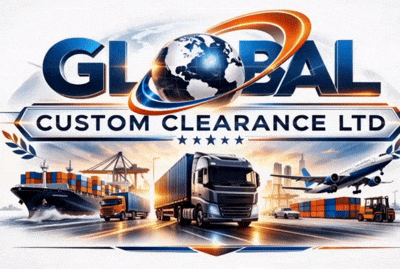Customs Clearance Agents in the UK: Your Essential Guide to Smooth Import & Export Operations

In today’s fast-paced global trade environment, businesses and individuals dealing with international shipments often face one significant hurdle—customs clearance. Whether you are importing goods from Asia or exporting products to the EU, navigating the complexities of UK customs can be a daunting task. This is where customs clearance agents UK play a pivotal role.
These experts act as a bridge between the trader and UK customs authorities, ensuring that all the legal requirements are fulfilled and the goods move smoothly across borders. In this comprehensive blog, we will explore who customs clearance agents are, their roles, why you need one, and how to choose the right agent for your business.
Who Are Customs Clearance Agents?
Customs clearance agents, also known as customs brokers, are licensed professionals who assist importers and exporters in meeting government regulations when shipping goods across international borders. In the UK, they are often registered with HM Revenue & Customs (HMRC) and have in-depth knowledge of customs procedures, tariffs, duties, and relevant paperwork.
Their primary job is to make the process of clearing goods through customs as efficient and compliant as possible.
Why You Need a Customs Clearance Agent in the UK
Importing and exporting goods involves a host of legal, financial, and logistical considerations. Here’s why hiring a customs clearance agent in the UK is beneficial:
1. Expert Knowledge of Regulations
UK customs rules can be intricate, particularly after Brexit. Regulations can vary depending on the type of goods, their value, country of origin, and more. Agents stay updated on these rules and ensure your shipment complies with them.
2. Accurate Documentation
Improper or incomplete documentation is one of the top reasons for delays and fines at customs. Agents ensure that all necessary forms—such as the commercial invoice, packing list, import/export declaration, and certificates of origin—are correctly completed and submitted.
3. Time & Cost Efficiency
With their experience and network, customs clearance agents can speed up the clearance process and help avoid costly delays or errors. This saves businesses both time and money in the long run.
4. Duty and Tax Calculation
Agents help calculate duties, VAT, and other applicable taxes, ensuring there are no surprises for you or your clients. They can also advise on available tax reliefs or duty suspension schemes.
5. Handling Inspections and Queries
If customs officials decide to inspect your goods or question your declaration, an agent can handle these interactions professionally on your behalf, ensuring minimal disruption.
Key Responsibilities of UK Customs Clearance Agents
Customs agents handle several essential tasks, including:
- Preparing and submitting import/export declarations to HMRC
- Coordinating with freight forwarders and shipping lines
- Advising on classification codes (HS codes)
- Ensuring compliance with trade laws and embargoes
- Managing excise duty procedures for alcohol, tobacco, or fuel
- Assisting with special regimes like Inward Processing Relief (IPR) or Customs Warehousing
Customs Clearance After Brexit: What Has Changed?
The UK’s departure from the EU has introduced a new layer of complexity to customs procedures. Goods moving between the UK and EU are now subject to the same customs rules as goods from the rest of the world.
This means:
- All goods must be declared
- Import VAT is due on most goods
- Rules of origin are crucial for claiming tariff preferences
- UK businesses must have an EORI (Economic Operators Registration and Identification) number
A customs clearance agent can help businesses navigate these changes and ensure smooth cross-border trade post-Brexit.
Types of Shipments Handled by Customs Clearance Agents
Agents in the UK deal with a wide range of shipments, including:
- Air Freight: Clearing goods at major airports like Heathrow, Gatwick, and Manchester.
- Sea Freight: Handling container shipments at ports like Felixstowe, Southampton, and Liverpool.
- Road Freight: Especially important for goods transported via the Channel Tunnel or ferries.
- Courier & Express Shipments: Supporting businesses using services like DHL, FedEx, or UPS for faster deliveries.
How to Choose the Right Customs Clearance Agent in the UK
Selecting the right agent can make a significant difference in the efficiency of your logistics. Consider the following factors:
1. Experience and Expertise
Look for agents with experience in your industry or the specific type of goods you handle. Their familiarity with your product’s classification can streamline the process.
2. HMRC Accreditation
Ensure the agent is recognized by HMRC and can act on your behalf. Many reputable agents are members of organizations like BIFA (British International Freight Association).
3. Technology and Tracking
Modern agents use digital systems to track shipments and provide real-time updates. Choose an agent who offers transparency and efficient communication.
4. Customer Reviews
Check for testimonials, online reviews, or ask for references. A well-reviewed agent is more likely to provide reliable service.
5. Cost Structure
Ensure their fees are transparent. While the cheapest option isn’t always best, a good agent will offer value for money with quality service.
Common Challenges Without a Customs Clearance Agent
Attempting to handle customs clearance without expert help can result in several issues:
- Delays at ports or airports
- Incorrect duty or VAT payments
- Fines due to non-compliance
- Confiscation or return of goods
- Damaged business relationships due to late delivery
Hiring a trusted agent avoids these pitfalls.
Future of Customs Clearance in the UK
As global trade evolves and digital customs become more widespread, UK customs agents are adapting fast. The adoption of CDS (Customs Declaration Service), replacing CHIEF, marks a significant modernization. Soon, blockchain, AI, and automation will further simplify the clearance process, making agents even more vital as digital intermediaries.
Conclusion
Whether you are a small business owner importing goods from Europe or a large corporation exporting products worldwide, a customs clearance agent UK can be your most valuable logistics partner. With their deep understanding of trade rules, documentation, taxes, and compliance, they ensure your goods move efficiently and legally through customs checkpoints.
Choosing the right agent means choosing peace of mind, reliability, and professionalism—qualities essential to maintaining a successful global supply chain.



